(Editor’s Note: This guest blog post was written by the Safe Delhi Campaign Team to recap their efforts during International Anti-Street Harassment Week in Delhi, India)
CONTEXT:
 Delhi has changed a lot in the past decade. Skyscrapers, flyovers, shopping complexes rapidly covered the city making it for a particular section of the society. But, a general animosity and a sense of belongingness lacks in the city. Equal participation in the city and the right to ownership is not guaranteed for women. The sense of enjoyment, of loitering and of using public places in the way they desire are very limited and at times non- existent. Their presence in this ‘urban city’ has to be constantly negotiated and compromised. The fear of and the incidence of being sexually harassed in public spaces have unfortunately become a part a woman’s experience in the city.
Delhi has changed a lot in the past decade. Skyscrapers, flyovers, shopping complexes rapidly covered the city making it for a particular section of the society. But, a general animosity and a sense of belongingness lacks in the city. Equal participation in the city and the right to ownership is not guaranteed for women. The sense of enjoyment, of loitering and of using public places in the way they desire are very limited and at times non- existent. Their presence in this ‘urban city’ has to be constantly negotiated and compromised. The fear of and the incidence of being sexually harassed in public spaces have unfortunately become a part a woman’s experience in the city.
Women’s access to safe and violence free public spaces is her right. Sexual harassment in public spaces restricts choices and opportunities for women in education, livelihood, health and decision making. The gendered nature of public spaces not only denies their access but also ‘legitimizes’ the invisibility of women after a particular hour of the day. It is the right of every citizen to enjoy public spaces irrespective of gender, caste, class, sexuality, disability or any other social identity. The responsibility of society to ensure equal rights for all has to increase. Safety and right to the city can be guaranteed with a more sensitive and effective service delivery for all the citizens. It is time to understand and address factors of safety and make the city accessible and inclusive for all.
Global Week on Anti Sexual Harassment and Safe Delhi Campaign:

100 co-sponsors across the world have joined hands to mark the International Anti-Street Harassment Week, a program of Stop Street Harassment . A core team of activists led by Holly Kearl volunteered their time to make the campaign possible. Last year, the first Anti Street Sexual Harassment Day was celebrated in Delhi and saw the largest turn out worldwide. The march coordinated by Safe Delhi Campaign and a group of students from University of Delhi, saw participation from students, faculty and police constables. This year the plan has been expanded for a week.
Safe Delhi Campaign co-sponsoring the event in India called for action from different partners across the city -from individuals, to organizations to media houses. The intent was to involve people from different walks of life to talk about the issue and address it in their own way.
Objective of the Campaign:
- To initiate dialogues and discussions among students in different colleges and universities on safety in public spaces.
- To spread awareness on factors of safety through advocacy materials of the campaign.
- To initiate and moderate discussions on social media platforms on safety in public spaces and right to the city.
Dialogue with Students: ‘Let’s Reclaim Public Spaces’
The first day of The Global Anti Street Harassment Week 2012 was marked by an extensive discussion on gendering of public spaces with students from the Department of Human Development of Institute of Home Economics. Students shared their personal experiences of ‘gender’ as an identity that impacts their choices and opportunities to live equally in the city. The students deliberated on gaps in emergency helpline numbers for women.
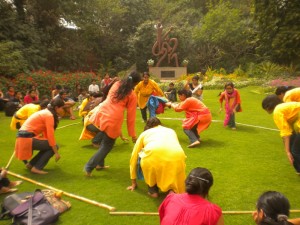 Service provisions like public toilets or well lit parks to also talking about the role of larger society to create an enabling environment for all. With the remark that safety is a woman’s right to the city, the students undertook a ‘class to class campaign’, sharing with students the message against sexual harassment on streets and also sharing some.
Service provisions like public toilets or well lit parks to also talking about the role of larger society to create an enabling environment for all. With the remark that safety is a woman’s right to the city, the students undertook a ‘class to class campaign’, sharing with students the message against sexual harassment on streets and also sharing some.
An open lawn discussion at Lady Sri Ram College for Women on ‘Reclaiming Right to Public Spaces’ was called by students from National Service Scheme on Tuesday, the 20th of March, 2012. There was an interesting discussion on the factors that attribute a place as being safe and unsafe. A street play by the college theatre society marked the beginning of the discussion. The students were shared helpline booklets, poster and other relevant material after the discussion. More than 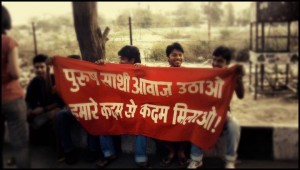 100 students participated in the discussion.
100 students participated in the discussion.
Let’s Make Delhi Safe for Women! Reclaiming Right to Public Spaces:
The recent weeks in the National Capital Territory of Delhi has seen an sudden increase of reported sexual assaults on women, mostly while their presence in public spaces. Following such incidences were remarks given to women to not work after 8 p.m. or to not wear “revealing clothes.”
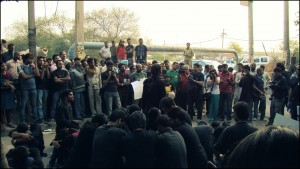 The blame of these and many more incidences was left on the woman. This led to agitation not just among the civil society group of the city but also individual masses. Everybody across the city decided to stand against violence on women and say no to unsafe public spaces.
The blame of these and many more incidences was left on the woman. This led to agitation not just among the civil society group of the city but also individual masses. Everybody across the city decided to stand against violence on women and say no to unsafe public spaces.
The first public protest was called in Gurgaon as a response to the incident that took place outside one of the malls in the area following which remarks by police representatives on girls should stay home after 8:00 pm was called for. The protest was joined by women’s groups, youth organisations, individuals from the city and several media houses as well. 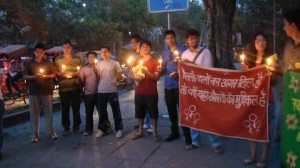 Following the first protest, a Citizen Charter of Demands was drafted and a petition to state agencies to implement the same was circulated all across. Social networking pages to public campaigns to meeting individuals where ever possible, the petition was taken all across the city.
Following the first protest, a Citizen Charter of Demands was drafted and a petition to state agencies to implement the same was circulated all across. Social networking pages to public campaigns to meeting individuals where ever possible, the petition was taken all across the city.
The city saw a series of public protests in different places and through different forms. To mark the end of the Global Week, the students from the University of Delhi called for a candle light vigil to “Reclaim your Right to Safe and Violence free City for Women.” The vigil was held on March 24, 2012, in the evening and was participated by residents of the area, students, individuals from the city asking for a right to safe public spaces. An appeal to more men to join

and for police support was constantly being made during the protest and that actually led to more people joining in the middle of the protest. More than 100 hundred people signed the petition and participated in the march.
CAMPAIGNING ONLINE
Photography Competition on Right to A Safe And Inclusive City
An online photography competition in solidarity with the Global week was hosted on the Safe Delhi Campaign Facebook page. The competition was well received and saw multiple entries. A panel of judges was formed to choose the winning photograph. Discussion around factors to make city safe was also initiated online.
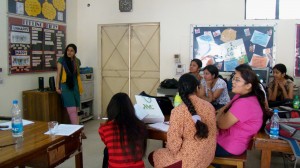

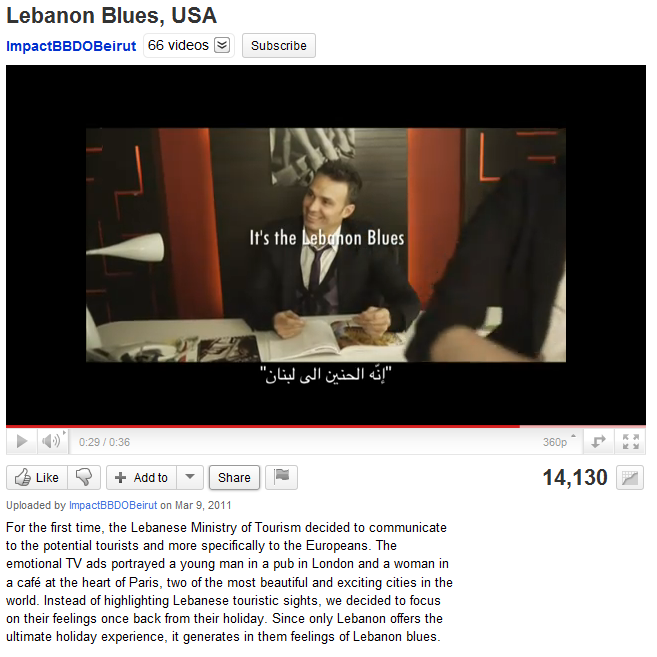
 Once when I was about 15 years old I was riding the subway when a man with an obvious erection weaved his way through the crowded car to stand directly in front of my friend and myself and proceeded to masturbate. As I was in the custom of carrying around a sharp pair of scissors, I pulled it out and stared at him as icily as possible until he retreated to a seat on the other side of the car.
Once when I was about 15 years old I was riding the subway when a man with an obvious erection weaved his way through the crowded car to stand directly in front of my friend and myself and proceeded to masturbate. As I was in the custom of carrying around a sharp pair of scissors, I pulled it out and stared at him as icily as possible until he retreated to a seat on the other side of the car.